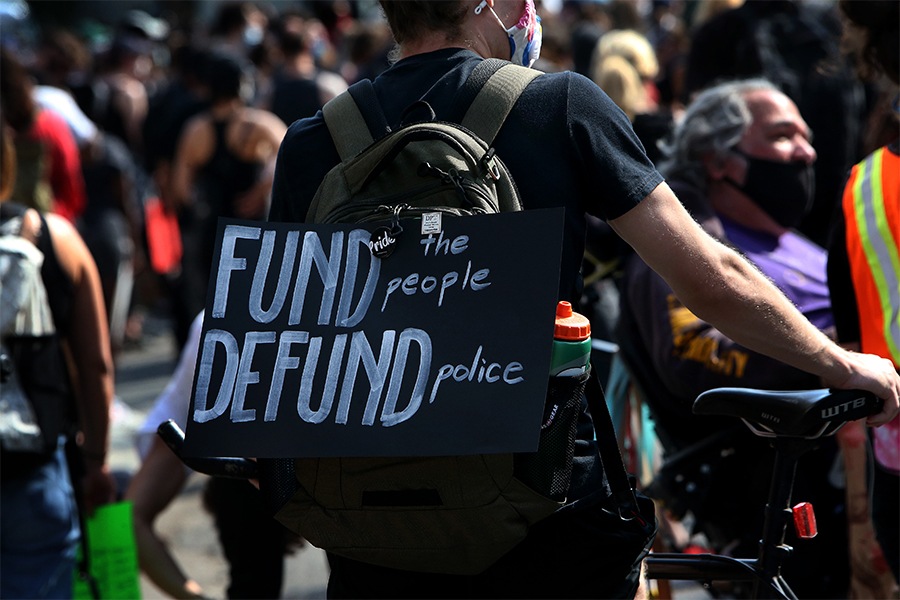Pressure Is Rising to Cut Police Budgets, but the Mayor Isn’t Completely on Board
Advocates for defunding the police say Marty Walsh’s suggested cuts don't go far enough.

Hundreds march with the Coalition of Black Youth in Boston on June 10, 2020. The protestors marched from Nubian Square to City Hall to urge Boston City Council to reallocate Boston police funding to youth jobs programs like SuccessLink, violence prevention, and to hire additional mental health counselors in Boston Public Schools. Photo by Barry Chin/The Boston Globe via Getty Images
Never before has the rallying cry to reform policing as we know it been this loud—or this sweeping. Demands for increased use of body cameras, greater diversity among officers, and better training for police on bias and racism are increasingly seen as tepid and ineffectual responses to the current crisis in policing—kind of like prescribing aspirin for a dying patient. In the wake of George Floyd’s death in police custody, protesters are calling on elected officials to either abolish or defund the police, essentially asking them to pull the plug on police departments’ life-support system: their budgets.
Boston is no exception. Residents are demanding that city leaders follow in the footsteps of officials in Los Angeles and Minneapolis, who have made moves to defund police budgets and even disband their police departments, respectively, in order to rebuild from the ground up. On Tuesday, Bostonians took these demands directly to the city council’s Ways and Means Committee, which has the power to convert a protest rallying cry into an official budget request.
During a marathon four-and-a-half-hour committee meeting devoted to the city budget earlier this week, all but 45 of those minutes were dedicated to testimonials from activists and residents, many of whom called for a reduction of the police budget by 10 percent, or some $41 million, and to reallocate those dollars to fund community programs that help prevent violence and address its root causes. “The 10 percent is a bare minimum,” said Vikiana Petit-Homme, a representative for a group of 20 black female organizers in the city, during Tuesday’s session. “Not only are police ineffective, but they are actively harmful in terms of contributing to the oppression of black, brown, and low-income communities.”
The demands made during the budget session came on the heels of an avalanche of resident phone calls and emails to city councilors with essentially the same message. “I have gotten over 5,500 emails and phone calls asking to defund the police and reallocate resources so we can better support communities of color instead of policing them,” Councilor-at-Large Julia Mejia said ahead of Tuesday’s meeting. “The budget is our biggest responsibility as the council. That is what one of our biggest roles is—to be fiscal stewards of our tax dollars and make sure that we are listening to constituents.”
Participants at the hearing recounted experiences of physical and sexual abuse at the hands of Boston police officers, gave impassioned pleas for investment in minority communities, and presented some eye-popping statistics. According to the Massachusetts office of the American Civil Liberties Union, for instance, police command 15 percent of Boston’s city budget—four times as much as the public health commission; 10 times more than libraries; and 182 times more than the Office of Arts and Culture, while police officer salaries dwarf those of other city employees, including the city’s highest elected official. Fully 530 Boston police officers make more than Mayor Marty Walsh’s $199,000 a year salary. Much of this pay—some $60 million—is in the form of overtime for police details, according to the Massachusetts ACLU. According to the Mayor’s office, the police budget is 11 percent of the city budget.
Activists, though, say that cutting BPD’s budget by 10 percent is just the start. Their hope is that police budgets will shrink ever smaller over time, along with the role of police in the city. “There should be civilian traffic enforcement, civilians that respond to people in mental crisis, and police details are something that should be done by civilians,” says Rashaan Hall, director of the racial justice program at the Mass ACLU. “When police don’t do those things, we won’t have as much of a need for them.”
Neither the police union nor the Boston Police department responded to requests for comment. In a statement sent to Boston Magazine late Thursday, Mayor Marty Walsh said he had been working with city hall and his cabinet in the wake of Floyd’s death to “make sure we are responding in a way that’s meaningful and brings about systemic change.” Then, on Friday morning, the Mayor held a press conference where he committed to cutting 20 percent of the police overtime budget, or some $12 million and investing them in programs for the community, far short of what residents proposed just a few days earlier. “It is a step in the right direction, but it isn’t what the people demanded” said Rashaan Hall, director of the racial justice program the Massachusetts ACLU. “The voice of the community has been resolute. It is unfortunate he hasn’t taken heed to it.”
At least not yet. Only time will tell whether Walsh’s move was simply a poor read of the situation after Tuesday’s outpouring of support for budget cuts, or if Bostonians asking city officials to pull the plug on the police may soon do the same to Walsh’s tenure as mayor, too.


